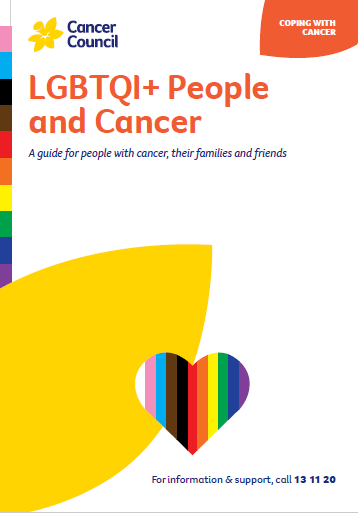- Home
- About Cancer
- LGBTQI+ People and Cancer
- Body image, gender and cancer
Body image, gender and cancer
Cancer and its treatment can change the way you look. This can affect how you feel about yourself (body image), regardless of sexual orientation, gender and sex characteristics. Even if other people can’t see the changes, they may still affect your body image.
Learn more about:
- Overview
- Removal of a body part
- Weight and bowel changes
- Loss of hair from the head and body
- Other changes to your appearance
Overview
Common physical changes to your appearance after treatment may affect how you feel about sex and intimacy. The changes you experience will depend on the type of cancer and treatment you have. Some of these changes are permanent, but others may improve with time.
How you feel about changes to your body image will vary. You might find some are positive, and others might be negative. You may feel less attractive. This can affect your identity, self-confidence, self-esteem and body image, which may mean you socialise less or feel excluded from your community. In some cases, you may feel that your body now aligns more closely to your identity.
Gender-affirming hormone therapies
Some cancers depend on hormones to grow (e.g. oestrogen may help breast cancer to grow, testosterone may help prostate cancer to grow).
If you are diagnosed with a hormone-dependent cancer and are taking gender-affirming hormones, your doctor may suggest adjusting your treatment. You may find this difficult to do, particularly if how you look changes. This is known as gender dysphoria. If this makes you feel anxious or depressed, it may help to talk to your doctor or call QLife on 1800 184 527.
→ READ MORE: Removal of a body part
Podcast for people affected by cancer
Listen now
We thank the chief investigators from the Out with Cancer research project: Prof Jane Ussher, Prof Janette Perz, Prof Martha Hickey, Prof Suzanne Chambers, Prof Gary Dowsett, Prof Ian Davis, Prof Katherine Boydell, Prof Kerry Robinson and Dr Chloe Parton. Partner investigators were Dr Fiona McDonald and A/Prof Antoinette Anazodo. Research Associates were Dr Rosalie Power, Dr Kimberley Allison and Dr Alexandra J. Hawkey.
We thank the reviewers of our LGBTQI+ People and Cancer booklet: Prof Jane Ussher, Chair, Women’s Heath Psychology and Chief Investigator, Out with Cancer study, Western Sydney University, NSW; ACON; Dr Kimberley Allison, Out with Cancer study, Western Sydney University, NSW; Dr Katherine Allsopp, Supportive and Palliative Care Specialist, Westmead Hospital, NSW; A/Prof Antoinette Anazodo OAM, Paediatric and Adolescent Oncologist, Sydney Children’s Hospital, NSW; Megan Bathgate, Consumer; Gregory Bock, Clinical Nurse Consultant–Oncology Coordinator, Urology Cancer Nurse Coordination Service, WA Cancer & Palliative Care Network, WA; Morgan Carpenter, Executive Director, Intersex Human Rights Australia (formerly OII Australia); Prof Lorraine Chantrill, Medical Co-Director Cancer Services, Illawarra Shoalhaven Local Health District, NSW; A/Prof Ada Cheung, Endocrinologist, Head, Trans Health Research Group, Department of Medicine (Austin Health), The University of Melbourne, VIC; Bonney Corbin, Australian Women’s Health Network; Cristyn Davies, Research Fellow, Specialty of Child and Adolescent Health, Faculty of Medicine and Health, The University of Sydney and Children’s Hospital Westmead Clinical School, NSW; Prof Ian Davis, Professor of Medicine, Monash University and Eastern Health, Medical Oncologist, Eastern Health, Chair, ANZUP Cancer Trials Group, VIC; Rebecca Dominguez, President, Bisexual Alliance Victoria; Liz Duck-Chong, Projects Coordinator, TransHub and Trans Health Equity, ACON, NSW; Lauren Giordano, 13 11 20 Consultant, Cancer Council NSW; Hall & Wilcox (law firm); Natalie Halse, BCNA Consumer Representative; Jem Hensley, Consumer; Prof Martha Hickey, Professor of Obstetrics and Gynaecology, The University of Melbourne, and Director of the Gynaecology Research Centre, The Women’s Hospital, VIC; Kim Hobbs, Clinical Specialist Social Worker – Gynaecological Cancer, Westmead Hospital, NSW; Dr Laura Kirsten, Principal Clinical Psychologist, Nepean Cancer Care Centre, NSW; Amber Loomis, Policy and Research Coordinator, LGBTIQ+ Health Australia; Julie McCrossin and Melissa Gibson, Consumers; Dr Fiona McDonald, Research Manager, Canteen, NSW; Dr Gary Morrison, Shine a Light (LGBTQIA+ Cancer Support Group); Penelope Murphy, Cancer Council NSW Liaison, Prince of Wales Hospital, NSW; Dr Rosalie Power, Out with Cancer study, Western Sydney University, NSW; Jan Priaulx, 13 11 20 Consultant, Cancer Council NSW; Paul Scott-Williams, Consumer; Simone Sheridan, Sexual Health Nurse Consultant, Sexual Health Services, Austin Health, VIC; Cheryl Waller and Rhonda Beach, Consumers.
View the Cancer Council NSW editorial policy.
View all publications or call 13 11 20 for free printed copies.
Need to talk?
Support services
Coping with cancer?
Speak to a health professional or to someone who has been there, or find a support group or forum
Need legal and financial assistance?
Pro bono services, financial and legal assistance, and no interest loans
Cancer information
Dealing with the diagnosis
Common reactions to a cancer diagnosis and how to find hope
Explore our resource hub
Explore and download our booklets, fact sheets, podcasts, webinars and videos for people affected by cancer
